Masters in Finance in Ireland: Top 8 Universities, Fees [BONUS: Module Reviews]

Interested in pursuing a Masters in Finance in Ireland?
If you are exceptionally curious and analytical, have a bachelor’s degree under your belt, and are eager to dive deeper into the world of economy and investments, then a Masters in Finance in Ireland is the best decision you would have ever made.
Hats off to you!
And we would love to support your decision as much as we can.
Scope of Finance
A career in finance is steadily increasing worldwide, particularly in Europe and Asia.
The role of finance within corporates is increasingly seen as an important one. Wall Street investment houses aren’t the only companies that value financial functions.
According to data from the U.S. Bureau of Labor Statistics, employment in business and financial operations occupations is projected to grow 8% from 2020 to 2030.
So, those who are seeking a career in finance have the potential to earn high and get quick placements.
In fact, careers related to Finance and Accounting have lower unemployment rates (3.9%), and related roles are expected to increase faster in the years to come.
Top 5 Benefits of Studying Masters in Finance in Ireland

1. High-quality education
Ireland is one of the topmost knowledge hubs in the world, providing high-quality education for students with a wide range of degree options that are accepted globally.
As per the IMD World Competitiveness Ranking 2022, Ireland ranks in the top 11 regarding education, employment, financial business, and much more.
2. Top-rated universities
You could be one of the lucky students to get the chance to study Masters in Finance in Ireland at a university that ranks highly in the Finance subject globally.
a. According to Financial Times, Ireland has two globally ranking universities for Masters in Finance pre-experience 2022 – Trinity College Dublin and University College Dublin.
b. QS Business Masters Finance Rankings 2022 has listed 3 Irish universities among the top 40 globally ranked among the top 110 globally for studying Masters in Finance in Ireland.

3. Peaceful country
Global Peace Index 2022 has ranked Ireland as one of the world’s top 3 most peaceful countries.
Tourists and students worldwide are welcomed warmly in Ireland to experience a peaceful and healthy lifestyle.
4. Career opportunities in Ireland
A great start will lead you to huge success by starting your career in Ireland, where there is a constant knowledge transfer between Universities and International Organizations.
Most top-rated banks build their financial operations in Ireland.
5. Cost of Studying in Ireland
The cost of studying in Ireland is less than the other abroad study destinations like Canada, the UK, the USA, and Australia.
A master’s degree costs anywhere between 10 to 30 Lakhs in Irish universities. Alternatively, you can complete your degree with 12 to 13 lakhs at any Irish private college or Institute of technology.
Other Top-Rated Articles: |
Masters in Finance in Ireland: Top Universities 2025
Top 8 universities for Masters in Finance in Ireland:
| Irish Universities for MS in Ireland | QS Global Rankings 2025 | |
| 1 | Trinity College Dublin | 87 |
| 2 | University College Dublin | 126 |
| University College Cork | 273 | |
| 4 | University of Galway | 273 |
| 5 | Dublin City University | 421 |
| 6 | University of Limerick | 421 |
| 7 | Maynooth University | 801-850 |
| 8 | Technological University Dublin | 851-900 |
Top Colleges for Masters in Finance in Ireland
| Colleges for MS in Ireland | Webometrics Ireland Rankings | Courses | |
| 1 | National College of Ireland | 16 |
|
| 2 | Griffith College | 24 | MSc in Accounting & Finance Management |
| 3 | Dublin Business School | 25 |
|
Masters in Finance in Ireland: Top Courses
Best Finance Masters courses in Ireland:
- MSc Finance
- MSc Financial Risk Management
- MSc Aviation Finance
- MSc Quantitative Finance
- MSc Financial Mathematics
- MSc Corporate Finance
- MEconSc International Finance
- MSc Finance and Regulation
1. Trinity College Dublin
QS Ranking for Finance Subject: 31
Financial Times Ranking in Finance Subject: 1st in Ireland and 26th globally (2021)
Salary Percentage Increase: 53
Employability Ranking: 91

The finance program is offered in two different strands at TCD:
1. MSc in Finance
Masters of Finance at Trinity College Dublin is a 1-year full-time programme with many international recognitions. Experts designed and delivered the course to provide the highest analytical and practical training possible.
TCD’s Business School is partnered with the Chartered Alternative Investment Analyst (CAIA) Association and is affiliated with the Chartered Financial Analyst (CFA) Institute. As a result, these two bodies recognize the academic and industry-relevant skills trained here.
After completing the MSc in Finance at TCD, the graduates are encouraged to take the CFA examinations and are offered several CFA scholarships every year.
Module Review:
This program has 9 modules split across 3 semesters. Students are allowed to select four electives in semester one. The final semester comprises the dissertation project, which helps showcase the gained knowledge to enhance the student’s career potential.
TCD’s renowned Corporate Finance module falls in the first semester. This module addressed the industry’s three crucial issues – how corporations choose investments, how corporations choose to raise capital, and how they choose to redistribute any surplus earned.
2. MSc in Financial Risk Management
This programme ranks 1st in Ireland and 1st globally for Insurance, Risk, and Actuarial Sciences (Eduniversal 2021) and is recognized by the Global Association of Risk Professionals (GARP).
This is designed for students who want to assess and interpret the risks of financial risk and assessments through modern financial tools from a risk perspective.
Lectures for this programme are global industry professionals, practitioners, and consultants from the finance risk field.
Module Review:
MSc in Financial Risk Management at TCD comprises 8 core modules split across two semesters and a dissertation project in the third semester. In addition to this, four electives come as a part of this programme.
2. University College Dublin
QS Ranking for Finance Subject: 35
Financial Times Ranking in Finance Subject: 36
Salary Percentage Increase: 49
Employability Ranking: 87
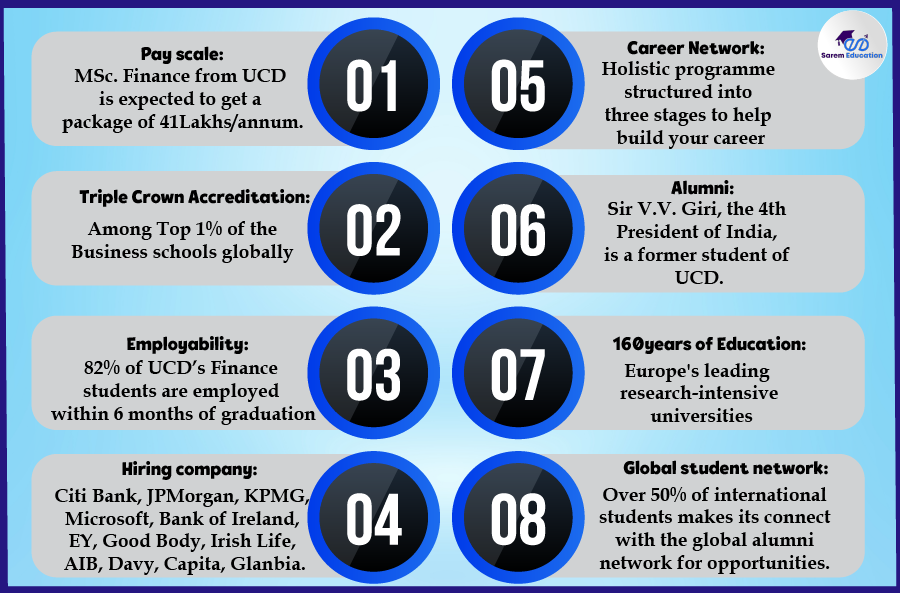
UCD offers Masters’s in Finance across four strands:
1. MSC in Finance
MSc in Finance at UCD is a 1-year full-time program, including 70% of the CFA (Chartered Financial Analyst Institute ) body of knowledge. You will get an early start toward achieving the internationally recognized CFA qualification.
Module Review:
The program has 11 modules split across three semesters. In addition, the applicant is free to choose one elective in the third trimester, and the dissertation project is one of the electives.
On completion of these modules, a student will be able to,
- Have up-to-date knowledge of the theory and practice of the financial services sector
- Have effective communicators in the corporate finance and risk sectors
- Evaluate critical corporate investment decisions
- Comment on the corporate critical financial decision
- Become effective team members
2. MSc in Aviation Finance: (Exclusively at UCD in Ireland)
This course covers a wide range of financial disciplines related to aviation finance, specifically focusing on the practical features of global aviation markets.
These courses are suitable for graduates from various disciplines, including business, economics, Finance, engineering, and science, who wish to pursue a career in the highly dynamic aviation finance and leasing industry.
Module Review:
Students must complete eleven core modules to complete the program. In addition, the summer term offers students the opportunity to complete a research project, two option modules, or in some cases, apply for internships.
On completion of these modules, students will be able to,
- Have subject-specific knowledge of the theory and practice behind the aviation finance and leasing industry
- Handle critical and analytical decision-makers
- Communicate aspects relating to aviation finance and aviation more generally
- Talk, apply, and act to solve problems and contribute to business and society
3. MSc in Quantitative Finance: (Exclusively at UCD in Ireland)
Are you a person of numbers who has a never-ending thirst for mathematics and computations?
Then, this is your pick.
A 1-year MSc in Quantitative Finance at UCD will equip you with the theoretical, mathematical, and computational skills needed to pursue a career in quantitative Finance.
The course was awarded Risk Management Accreditation by the Professional Risk Managers International Association (PRMIA)
Module Review:
To complete the program, students must complete twelve core modules split across 2 semesters. In the final sem, students can complete a research project or two option modules or, in a few cases, apply for a limited number of possible internships.
To be selected for an internship, students must undergo a competitive recruitment process, including interviews with employers.
4. MSc Financial Mathematics
This program not just stops with providing relevant contemporary knowledge and skills in the financial sector but also trains the students with new digital innovations such as machine learning and digital trading.
Module Review:
The first two semesters comprise modules that provide extensive knowledge in advanced mathematics with financial applications, computational Finance, and statistical and data analysis.
During the third semester, students can apply theoretical learning to real-world situations through a work placement or explore theoretical and applied knowledge in greater depth by writing a dissertation.
3. Dublin City University
Times Higher Education Ranking for Business Related Subject: 151-175
Employability Rate: 191 – 200

This course is offered in two different strands:
MSc in Finance
Are you an aspirant who wants to assist in acquiring and managing funds? Or someone who wants to finance the economy, allocate risk, and support economic growth?
If you are any of these, a 1-year full-time MSc in Finance at DCU can be the best pick for your life.
Module Review:
A Masters in Finance at DCU has a core learning phase in its first semester, followed by two specialist streams in the second semester. Finally, the third semester comprises the dissertation project.
Second-semester streams (you can choose any1):
- Financial Management
- Capital Markets
On completion of the programme, a student will be able to:
- Understand the functioning of capital markets and financial choices in a corporate firm
- Master the techniques and skills to solve financial issues in the current economy
- Be effective decision-makers in the finance industry
2. MSc in Financial Mathematics : (Since 1996 at DCU)
Mathematics of Finance at DCU is the oldest program in Europe in its respective field and was awarded the only Stokes Chair in Financial Mathematics in the country in 2009.
Mr Abhishek Kulkarni, an Indian graduate of this program, was hired to teach at the American College in Dublin ten years ago.
He was placed at the cutting edge of finance as a Technical Trainer with QuantInsti (one of Asia’s pioneer Algorithmic Trading Research and Training Institutes) in Mumbai in 2015.
Module Review:
This course consists of 7 core modules spread across two semesters and two electives (each in one semester) to choose from four options.
4. University of Galway
Times Higher Education Ranking for Business Related Subject: 251-300
Employability Rate: 301 – 500
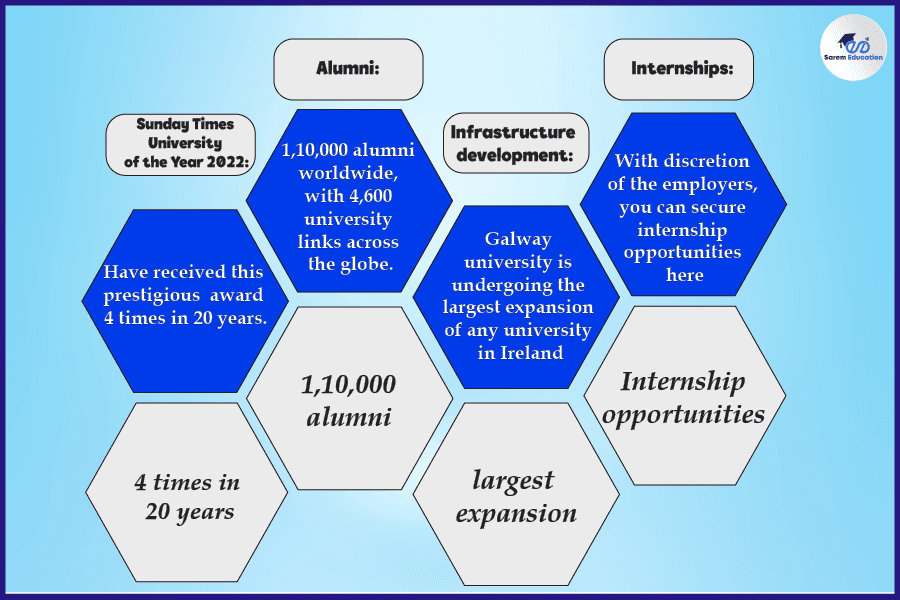
This program has two strands:
1. MSc in Corporate Finance
An MSc in Corporate Finance at the University of Galway is a 1-year full-time program run by the CFA Institute. This equips the students with the analytical and decision-making skills relevant to the finance industry.
MSC in Corporate Finance has been awarded exemptions from six ACCA subjects:
- Accountant in Business
- Management Accounting
- Financial Accounting
- Performance Management
- Financial Reporting
- Financial Management
Module Review:
Masters in Corporate Finance at the University of Galway is an 11-moduled program with two electives, one of them being a 12-week work placement opportunity. Still, it is at employers’ discretion whether they shortlist and offer a position to applicants.
2. MEconSc (International Finance)
This course gives a deepened understanding of the forces driving the global economy and the operations of international financial markets.
Graduates of MEconSc in International Finance are highly valued by commercial banks, investment banks, and other financial institutions.
Moreover, this skill adds high value also to public institutions such as Central Banks and multinational corporations.
Popular Recruiters: Goldman Sachs, J.P. Morgan, First Derivatives, European Central Bank, and Central Bank of Ireland
Module Review:
This 1-year course comprises 7 mandatory modules and one elective from an option of four.
5. University College Cork
Times Higher Education Ranking for Business Related Subject: 601+
Employability Rate: 201 – 250
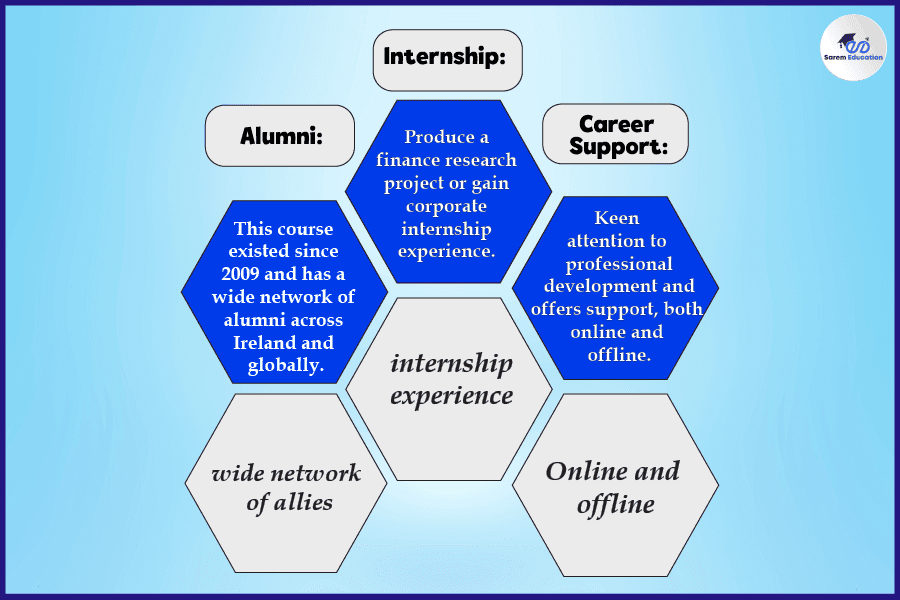
The MSc in Corporate Finance prepares you for careers in investment banking, large corporations, and business advisory firms. The curriculum is aligned with the industry course board to ensure it meets employers’ corporate finance skills needs.
This program has been accepted into the CFA Institute University Recognition Programme and the CAIA Academic Partner Programme and carries ACCA exemptions.
Module Review:
The finance program at UCC is offered in two parts. The first one contains 12 modules, out of which the Professional Development module provides additional training in industry-relevant skills.
Part two of the program allows you to choose either a research project or a corporate internship.
6. Maynooth University
Times Higher Education Ranking for Business Related Subject: 301 – 400
THE Young University Rankings 2022: 106
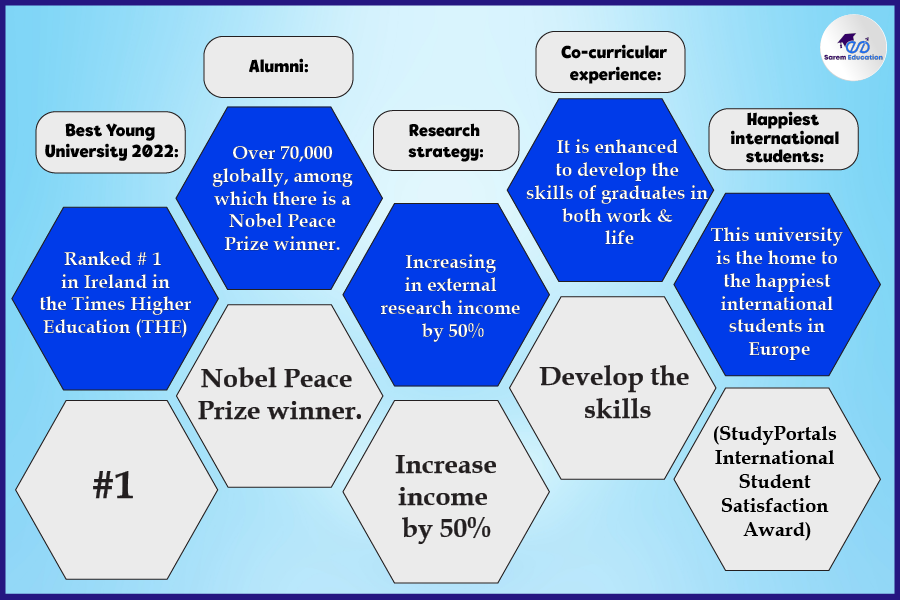
The study of Finance at Maynooth University opens doors to two different strands:
1. MSc in Finance
This 1-year full-time program is designed to produce graduates that meet the demands of employers by equipping them with extensive knowledge of real-world data and finance practice.
Module Review:
The course comprises core modules such as Asset Pricing and Portfolio Management, Corporate Finance and Valuation, Derivatives securities, and Financial Risk Analysis.
The speciality of the course: the Finance Live module. Here students get the chance to evaluate critical real-world situations and solve problems.
In addition, the university offers a novel summer school in Data Management and Financial Analytics and a year-long analytics and finance project.
2. MSc in Finance and Regulation
Our MSc Finance and Regulation graduates draw expertise from the disciplines of Finance and Law to provide students with a relevant and stimulating learning experience.
Module Review:
Finance Module: Designed for the graduates to apply financial theory to real-world problems with extensive use of real-world data helping to integrate theory with real-world practice.
Law Module: Focuses on the regulatory framework within the European Union to regulate the capital markets sector and the unique contractual and governance frameworks in place for Islamic finance transactions.
7. University of Limerick
Times Higher Education Ranking for Business Related Subject: 401 – 500
Employability Rate: 191 – 200

A 1-year MSc Financial Services program at UL entrusts the graduates with both academic and technical skills required for placing them in highly-valued financial positions within an organization,
As part of the program, students receive a Trading Floor Certification and an international business workshop, which leads to subsequent professional accreditation in the international financial services industry.
Did You Know?
Limerick is one of the most affordable cities in Ireland for students’ lifestyle
Module Review:
The Master of Financial Services at UL has 10 modules spread over two semesters, with three electives added to the second semester.
The third semester comprises two dissertation finance projects and one international business workshop.
Note: MSc Machine Learning in Finance is a 2 years part-time online course offered at the University of Limerick, which offers practical financial theory with an advanced technical skill set derived from computer science.
8. Technological University Dublin
Times Higher Education Ranking for Business Related Subject: 601+
THE Young University Rankings 2022: 351 – 400

The MSc Finance program at TUD has received huge applause from the graduates for providing the necessary skills in academia and research in major financial sectors like financial services, risk management, investment analysis, and international finance.
As per students’ feedback, the backbone of the Finance Masters course at TUD is the lecturing staff, who are highly knowledgeable, professional, and approachable in providing guidance.
Module Review:
This 1-year course has 11 modules split across two-semester, including a research and thesis component.
Cost of Studying Masters in Finance in Ireland
Tuition Fee for Master’s in Finance in Ireland
Average Tuition Fee for Master’s in Finance in Ireland:
| Universities for Masters in Finance in Ireland | ||
| Cost | ||
| EURO | INR | |
| Trinity College Dublin | 23,600 | 19.5 Lakhs |
| University College Dublin | 20,440 to 24,900 | 16.87 to 20.53 Lakhs |
| Dublin City University | 15,000 to 16,000 | 12.38 to 13.2 Lakhs |
| National University of Ireland, Galway | 17640 to 18,240 | 14.56 to 15.05 Lakhs |
| University College Cork | 18,500 | 15.25 lakhs |
| Maynooth University | 15,000 | 12.38 Lakhs |
| University of Limerick | 17,500 | 14.44 Lakhs |
| Technological University Dublin | 13,500 | 11.14 Lakhs |
| Colleges for Masters in Finance in Ireland | ||
| National College of Ireland | 15,000 | 12.5 Lakhs |
| Griffith College | 14,000 | 11.55 Lakhs |
| Dublin Business School | 12,750 to 13,800 | 10.51 to 11.39 Lakhs |
Pre-arrival cost in Ireland
It is not wrong to count every penny while deciding to take up an overseas degree. This is why you need to consider your pre-arrival cost as well.
The average cost of living in Ireland is around 10,00,000 Lakhs per year, including accommodation costs, food, and other essentials.
| Pre-arrival Requirement | Cost in INR |
| Student visa | 11,000 |
| IELTS | 15,500 |
| TOEFL | 14,197 |
| PTE | 14,700 |
| Funding proof | 10,00,000 |
| Health Insurance | 12,400 to 15,000 |
| Flight charges | 30,000 (average) |
In order to qualify for a student visa, you must show proof of funding of EURO 12000 for your living expenses.
Requirements to Pursue Masters in Finance in Ireland
The admission committee in the Ireland universities will review your application, where you have to meet the international requirement.
However, you won’t be admitted automatically if you meet these requirements because there is high competition for top finance programs in Ireland from universities worldwide.
Academic Requirements for MSc Finance in Ireland
A bachelor’s degree in Engineering, Mathematics, Physics, Business/Commerce with subjects such as Economics or Finance, or a Finance related area.
- The university process for Masters in Finance in Ireland expects the candidates to have an academic percentage of 65% and above with less than seven backlogs
- The academic percentage for Private Colleges is 55% and above, with less than ten backlogs
English Proficiency Requirements for MSc Finance in Ireland
English proficiency is measured by students’ TOEFL, IELTS, PTE, and Duolingo scores when applying for a Master’s in Finance in Ireland.
| English Language Requirements (minimum eligibility criteria) | |
| Universities | IELTS: 6.0 with no band less than 5.5* TOEFL: 90iBT Duolingo: 100 PTE: 63 |
| Colleges | IELTS: 6.0 TOEFL: 90iBT PTE: 60 Duolingo: 95 |
*Note: some programs require a minimum of 6.5 in IELTS
Procedures and Documents Required for MS in Finance in Ireland
- A completed Online Application Form
- Official copies of the academic transcripts
- English language proficiency certificates (e.g., IELTS/TOEFL, Duolingo)
- A copy of the picture page of your passport
- C.V./Resume
- 2 Reference letters, one being an academic reference from a former lecturer and the other from the employer. If a graduate doesn’t have work experience, both letters can be from their academic lecturers
- Statement of Purpose. Your statement should be approximately 500 words
Intake Options in Ireland
There are two intakes for an MS in Ireland – Spring and Autumn.
Autumn intake application deadline – June/July
Spring intake application deadline – October
Scholarships for Masters in Finance Ireland – Indian Students:
International students wishing to study in Ireland for a postgraduate degree are eligible to apply for the Government of Ireland International Education Scholarship.
Those who meet the eligibility criteria will receive a full tuition fee refund and an additional 10,000 euros to cover their living expenses during the program. How exciting!
| University | Scholarship | Waiver |
|---|---|---|
| Trinity College Dublin | Postgraduate Indian Scholarships | €3,000 |
| Global Excellence Postgraduate Scholarships | €2000 to €5,000 | |
| Trinity Business School Scholarships | Up to €10,000 | |
| CFA Scholarships | Not disclosed (provided after MSc Finance course completion) | |
| University College Dublin | MSc Academic Excellence Scholarship | Up to 25% to 50% of tuition fees |
| MSc Merit-Based Scholarships | €2,000 | |
| The Cormac Costelloe Dell Financial Services Scholarship | Full tuition fee waiver | |
| VV. Giri Global Excellence Scholarship | Full tuition fee waiver | |
| Dublin City University | DCU International Merit Scholarships | Up to €2,000 |
| University of Galway | South Asian Student Scholarships | Up to 50% of tuition fee |
| University College Cork | SEFS International Student Merit-Based Scholarship | Up to 20% of tuition fee |
| Maynooth University | Taught Master’s Scholarships | €2,500 |
| University of Limerick | Indian Students Scholarships | €1,500 |
Career Prospects after Masters in Finance in Ireland
Career opportunities in business and financial operations occupations are projected to grow 8% from 2020 to 2030, adding about 750,800 new jobs in this field.
A Masters in Finance in Ireland can let you enjoy an amazing career in banking, insurance, financial accounting, retail banking, auditing, and risk management.
You can build your profile in top companies or join a start-up or small organization by choosing a particular niche.
Average Salary
The national average annual salary for a Master in Finance in Ireland is € 43,568 per annum. The average salary for freshers starts from €23,000 to 30,000 per year and increases with experience.

Info Courtesy: Glassdoor
Popular Recruiters for Masters in Finance in Ireland
Find the list of some popular recruiters for MSc Finance in Ireland:
- Bank of Ireland
- EY (Ernst & Young)
- Deloitte
- Susquehenna International Group
- Davy
- KPMG
- Allianz Partners
Jobs after MSc in Finance in Ireland
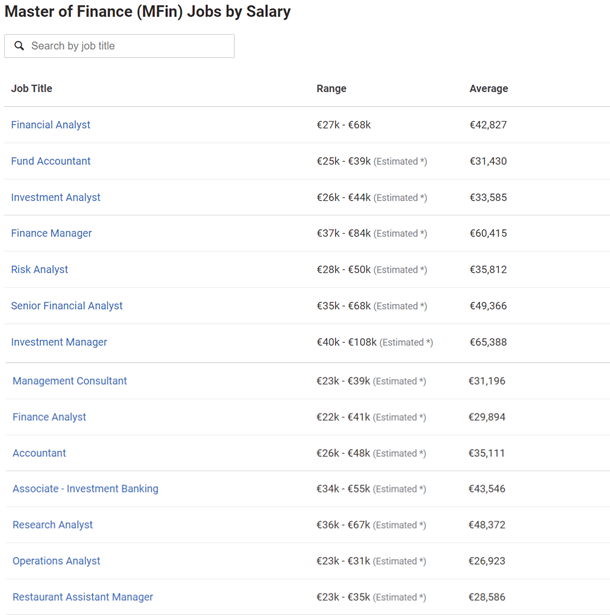
Info Courtesy: Payscale
Top Picked Questions by Our Students
1. Is Ireland good for MS in Finance?
Ireland is good for any postgraduate degree offered under the business school category, as this country is the best option for many industrial giants and has favourable conditions for establishing start-ups.
Masters in Finance falls under the business category and is one of the most needed skills in the country.
2. Is Masters in Finance a good option?
Certainly. Here are 3 reasons you should consider taking a Masters in Finance.
- Comparatively many specializations
- High-in-demand skills in many industries
- Infinite overseas opportunities
3. What jobs can I get after my Masters in Finance?
These are the popular jobs graduates get placed in after an MS in Finance degree.
Corporate investment banker, Financial analyst, Financial advisor, Stockbroker, Personal Financial Advisor, Financial manager, Investment Consultant, and much more.
4. Do I require a GMAT score for MS in Finance in Ireland?
GMAT is not a mandatory criterion for taking up a postgraduate Finance course in Ireland. But some universities ask for a GMAT score based on the application criteria.
5. Do Irish universities ask for work experience for a Master’s in Finance?
None of the Irish universities asks for a work experience as an entry requirement for MS in Finance.
However, certain universities consider this one of the entry criteria if the candidate does not meet the minimum academic requirements.
Want Help in Pursuing Your Masters in Finance in Ireland?
As a Study in Ireland consultants, Sarem Education helps ambitious graduates realize their dreams quickly by guiding them through all the nuances of applying for an MS in Finance in Ireland.
The info you get in your FREE consultation call is everything you can meet in the application process. This means we are no fancy storytellers. Our approach is transparent.
Hence, this is what we can do for you (FREEBIES exclusively at Sarem):
- Provide help in applying to universities
- Help write LORs and SOPs
- Offer 100% authentic information on universities in Ireland for masters
- Relieve the various pains you have in processing your visa
- Offer a Lyca sim card before you travel to Ireland
- Help connecting to alumni from various Irish universities
- Assist in finding part-time jobs and accommodation
Request a Call Back
Comments are closed.
